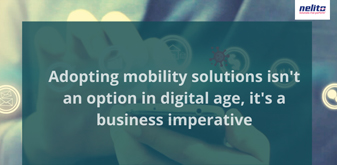How Mobility is Transforming Financial Services?
Updated On : June 2018
Among all the industries where technology has become a defining factor and is taking the industry by storm, the financial services industry is facing a hurricane. Among all the technologies that are shaking up the financial world, the one that is bringing in the most significant transformations across the board is mobility.
The financial organisations on the other hand, are working hard to ensure that customers can manage and take care of their wealth management, capital market, banking or e-commerce transactions on any mobile device, whenever they want, from anywhere in the world. Customers, today, while investing their money to grow with reliable and effective financial services also want complete control of their funds.
The introduction of mobility solutions in the financial sector has erased the traditional methods of working and brought about a great change in the working style that the industry has been used to.
- It has helped enterprises stay connected with the world besides speeding up the process.
- Mobility is helping organisations meet customer expectations, increase employee productivity and cut down on the cost of day to day transactions carried out manually.
- With mobility the transaction process is automated without any human participation.
- Customers are getting familiar and comfortable with undertaking basic financial services on their mobile devices.

Image Source : https://www.mazars.com/Home/News/Latest-News3/Financial-Services-Future
Here are some of the transformations that have resulted due to mobility in the Banking, Financial services and Insurance (BFSI) industry:
- Bank employees working processes have moved on to smart phones and tablets replacing personal computers.
- All banks and financial institutions have advanced websites and mobile apps for customers to carry out their financial transactions and other processes through their mobile devices.
- Banks work together with app development companies to constantly upgrade their mobile apps to enable customers to manage their bank accounts globally, from any location they are in.
- With Mobile banking, customers can get any information about the bank’s financial services in detail.
- With multiple security checks at every step, customers are assured of performing more secure transactions through mobile and web apps.
Mobile technology, having shaped the concept of mobility in the financial services industry, has been classified into three types by the Monetary Authority of Singapore and defined as the following –
Mobility of Technology
Mobility had a tremendous effect on the way device owners consume information or products or services. Mobile devices gave the freedom to choose the place, the time and the way to connect with people or brands on the go, be up-to-date with momentary news and perform a range of tasks on the move.
The connected mobile technology made it possible for businesses to reach their customers anytime through channels preferred by the customers
Mobility of Ideas
The mobility of Ideas is made up of three elements, each powered by a set of innovators and underlying technological developments. The elements are - crowdsourcing platforms, real-time transactions and borderless connectivity.
Crowdfunding or crowdsourcing platforms, which are committed to different purposes, have increasingly emerged as a new and successful way to raise funds for NGOs, start-ups, inventions, and real estate investments.
In real-time transactions and interaction, the major factor in transforming the global payment industry is the block chain technology.
Borderless connectivity and open innovation have paved the way for affordable financial services for people almost everywhere in the world, by enabling higher financial inclusion and access to advanced tech-powered solutions.
Mobility of Payments
Mobility of payments has transformed consumer behaviour and habits and also the way new marketing strategies are built to adapt the new way of payment. Online payment services have enabled low-cost, safe and efficient cross-border payments for businesses and individuals.
The financial organisations checklist before implementing mobile technologies
As much as the world is moving ahead with financial technology, organisations need to check on a few points before implementing any mobile solutions -
- Is employees productivity going to improve and how?
- How is it going to enhance customer satisfaction?
- What kind of mobile applications will improve the financial services productivity and hence improve the return on investments?
- Is the data which is highly sensitive and needs to be protected effectively, secure enough?
Mobility today is transforming financial services in a big way. It is providing a whole new experience with a huge benefit over traditional banking while making customers lives easier, while empowering and encouraging them to actively participate in their financial lives.






Comments :